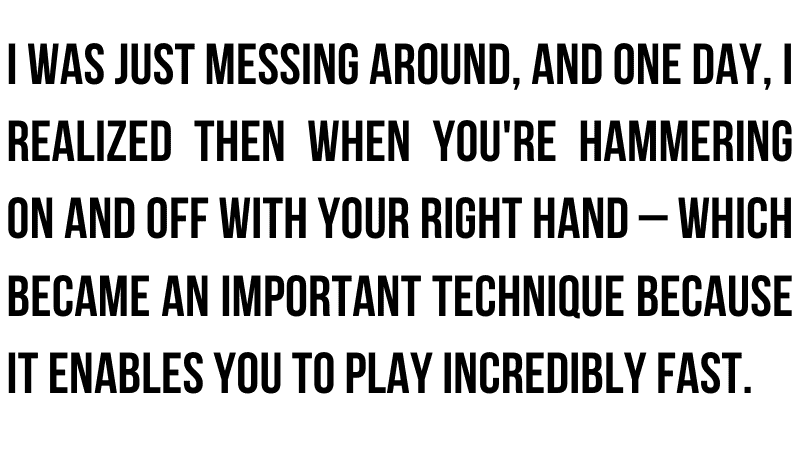Steve Hackett, legendary guitarist who’s best known for his work in Genesis when they were in their progressive rock phase, recently looked back on how he started using the two-hand tapping technique in the 1970s.
While talking to Guitar World, was asked how he feels about developing the now-famous two-hand tapping technique and whether he could ever believe it would become so huge over the years. He replied:
“I was so young when I discovered that, and I just thought it sounded brilliant at the time. No, I never could have imagined it.”

“I was just messing around, and one day, I realized then when you’re hammering on and off with your right hand – which became an important technique because it enables you to play incredibly fast – I remember thinking about it and coming to the idea that I could do something on one string without necessarily having to move to another.“
“And then, when I applied that to the whole of the fretboard, I found that I could do some incredible things.“
Reflecting on the tapping technique, which was eventually popularized on the electric guitar by Eddie Van Halen in the late 1970s and the early 1980s, he concluded:
“It’s an extraordinary technique, becoming the mainstay of many heavy metal players. I suppose I’m thrilled to have been the granddaddy of that.”
When asked whether he recalls the moment that he actually discovered it, Hackett replied:
“I can’t recall the exact moment, but I remember how it made me feel. It’s probably the guitar-playing equivalent of splitting the atom. Just to feel that it’s possible to be able to do something that, at one time, only keyboard players could do, was exhilarating. And now, for over 50 years, it’s been a part of the rock ‘n’ roll vocabulary.“
However, discussing the matter, Steve seems to have remembered when he actally sed it in a song for the first time, offering:
“Thinking about it, I first recall doing it in ’71 on ‘Nursery Cryme.‘ I recall that I struggled to play it in time, but I practiced it live during some solos with Genesis, and that’s when other people picked up on it. I didn’t realize its significance in the universal sense back then. At the time, I thought it was personal to me and that I was the only person doing that.”
The issue with the tapping technique is that it actually existed for a very long time before Eddie Van Halen, and even before Steve Hackett. On the other hand, one can also argue that it’s one of those things that multiple different guitar players figured out without ever finding out about the previous examples.
Before Hackett, we also had guitar players like Frank Zappa, Roy Smeck, and even engineer Harry DeArmond who wanted to showcase the sensitivity of his guitar pickup design. Italian guitarist Vittorio Camardese also used the technique on an acoustic guitar in the 1960s. You can check that out below.
And we can go even further back to the likes of Niccolò Paganini who implemented the technique on the violin. Nonetheless, Eddie Van Halen still remains the most popular musician to implement the technique.
After all, we can safely say that he improved the two-finger tapping and brought it to the next level. No one before him really used the technique in the same way and by playing through high-gain settings.
Elsewhere in the interview, he addressed tapping by offering:
“When I first developed the two-hand technique, I didn’t know that others had picked up on it. I was blown away once it started happening all over, and it was so influential. Let’s put it this way: it influenced more people than I could possibly have imagined.“
“It’s still part of what I do, but obviously, it’s not the whole thing. I’m very happy to have freed up guitarists to play dazzling solos and come up with things that would only be dreamt up at one time.”
During the chat, he was also asked about revisiting Genesis’ classic live album “Seconds Out” and why he did it after all these years. He replied:
“It was a combination of things. I suppose it seemed logical to do this because these songs mesh so well with my solo material. It’s also a case of wanting to do favorites and balancing that against my want to play the new material. These songs provide a certain flow and continuity to my show. ‘Seconds Out‘ was and is a colossal album in the UK, and I felt it was time to revisit it properly.”
Asked whether this is more for fans’ pleasure than for his own, he said:
“In a way, yes. It’s all the stuff that I felt they deserved. In other words, the fans who weren’t comfortable with the band’s direction after a certain point, which I like to think of as the disenfranchised early fans of Genesis, it was a need to try and satisfy them.
“‘Seconds Out‘ was always an album that encompassed most of the classic ’70s Genesis era. So, my thinking was that if I revisit that, I’ll make a lot of fans happy. I wanted to deliver this sort of show for fans who have missed out on a lot of gigs due to COVID.”
Asked about the album’s significance and reminded how this marked his final release with Genesis, Hackett said:
“I think ‘Seconds Out‘ is the bridge between two eras. You’ve got my era of Genesis, which had longer, more complicated compositions with virtuosic things. And then, once I’d gone, you had simpler songs that were more akin to pop music. What I liked most about ‘Seconds Out‘ is that it featured a lot of the most accessible songs from my era, which made it a fun listen for those who don’t favor complex music.“
“By the time ‘Seconds Out‘ was released, even toward the end of my time, Genesis was becoming more accessible for those who wanted to sing along. But also, there was a lot in it for those who wanted to take up keyboard, drums, guitar, or whatever. I think that split-personality, if you will, was part of the album’s success, which is why it sells so well and continues to do so.”
Photo: Mikemertes (Steve Hackett at Talking Stick Resort in Scottsdale, Arizona), Carl Lender (Eddie Van Halen at the New Haven Coliseum 2)


